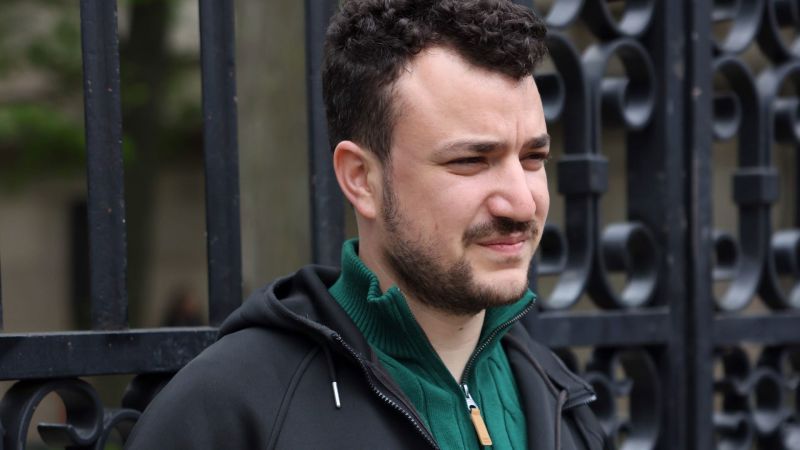CNN
—
The case against pro-Palestinian activist Mahmoud Khalil will remain in New Jersey after a judge denied a government motion to have the case transferred to Louisiana where the Columbia graduate student remains in federal custody.
Nearly a month after Khalil’s arrest, US District Judge Michael Farbiarz concluded the New Jersey district court has jurisdiction over the case because Khalil was in the state when his attorneys filed a habeas corpus motion seeking to challenge the legality of his detention, according to a 67-page decision filed Tuesday.
Khalil, a negotiator for pro-Palestinian student protesters in talks with Columbia’s administration over last spring’s contentious campus encampment against the Israel-Hamas war, was arrested outside of his apartment on Columbia University’s campus on March 8.
Khalil is one of several foreign nationals affiliated with prestigious universities who have been detained by Immigration and Customs Enforcement as part of the Trump administration’s immigration crackdown.
Rumeysa Ozturk, a graduate student with a valid student visa studying at Tufts University in Massachusetts, was taken into custody by masked immigration agents last month.
In a filing Tuesday, the US Attorney’s Office in Boston opposed Ozturk’s habeas petition, saying the Boston court does not have jurisdiction in the case because the Tufts University student was transferred out of the state shortly after her arrest.
Both Khalil and Ozturk were arrested near their homes, were transferred across state lines and eventually brought to an immigration detention facility in Louisiana.
Like Khalil, the Fullbright scholar is accused of being a threat to national security due to purported ties to terrorist organizations, such as Hamas.
Following a brief detainment in Manhattan, Khalil, a legal permanent US resident married to a US citizen, was transferred to an ICE facility in New Jersey. Several hours later, he was finally transferred to a detention center in Louisiana where he remains today.
Attorneys for the government argued in proceedings last week that the motion needed to be filed in Louisiana because that is where Khalil is located. But, Judge Farbiarz disagreed.
“The Petitioner was in custody in New Jersey as of March 9 at 4:40am,” Farbiarz wrote.
“And under a federal statute, the Petition, though filed in New York, must be treated as having been filed in New Jersey on March 9 at 4:40am. Therefore, this Court has jurisdiction.”
It is the Department of Justice’s second attempt at moving the case. Shortly after his arrest, attorneys for the Trump administration argued the case should be moved from New York to New Jersey. A New York federal district court judge granted the motion. The government then moved to file another motion to transfer the case from New Jersey to Louisiana.
The judge’s decision is welcome news to Khalil’s legal team and wife, Noor Abdalla, who is pregnant and due to give birth to the couple’s first child this month.
“This is an important step towards securing Mahmoud’s freedom, but there is still a lot more to be done,” Abdalla said in a statement Tuesday.
The next phase in Khalil’s case is to get him out of ICE detention, according to his attorney, Baher Azmy.
“We are grateful the court wisely understood that the government cannot try to manipulate the jurisdiction of the United States courts in a transparent attempt to shield their unconstitutional – and frankly chilling – behavior,” Azmy said in a statement to CNN.
Unlike Khalil, who was in New Jersey when his motion was filed, Ozturk, 30, was already taken across state lines when her attorney filed a similar legal order that is used to challenge the legality of a person’s detention or imprisonment, attorneys for the US Attorney’s Office in Boston said in the filing Tuesday.
“This court lacks habeas jurisdiction over this Petitioner because Petitioner was not in the District of Massachusetts when she filed her original petition seeking release from U.S. Immigration and Customs Enforcement (ICE) custody,” the attorneys wrote.
The government did not provide any new information about the case or charges against Ozturk in their latest filing.
A spokesperson for the US Attorney’s Office in Boston declined to comment.
The filing shows ICE officers determined there would be “no available bedspace” for Ozturk in the New England region prior to arresting her, according to court documents. The lack of bed space set off a dash across three states, and after two days of travel, Ozturk was eventually sent down south to Louisiana.
The government’s filing details their struggle to find a place to hold her.
First, Ozturk was moved to Methuen, Massachusetts; then to Lebanon, New Hampshire; and then to St. Albans, Vermont, where she was held overnight, according to court documents. From there she was transferred to Alexandria, Louisiana, followed by a final stop at the South Louisiana Correctional Facility in Basile, where Ozturk remains.
“This means Petitioner’s Amended Petition should have been filed in her district of confinement, the Western District of Louisiana, and any transfer of this Petitioner must be to such district,” attorneys for the Department of Justice wrote in their motion.
Ozturk’s attorneys will file a response to the government’s opposition Wednesday at 5 p.m., according to an order by Judge Denise Casper.
Khalil’s attorneys, some of which are also representing Ozturk, have accused the government of venue shopping and setting up jurisdictional fights in order to delay courts from hearing their motions for release.
“The government is trying to play a cruel game of jurisdictional musical chairs with Ms. Ozturk’s life, and her rights and freedom hang in the balance,” Brett Max Kaufman, senior counsel with ACLU’s Center for Democracy said in a statement. “We hope the court shuts this effort to manipulate our basic rights down and proceeds to addressing our client’s urgent claims.”
CNN’s Bob Crowley contributed to this report
This story has been updated with additional information.

